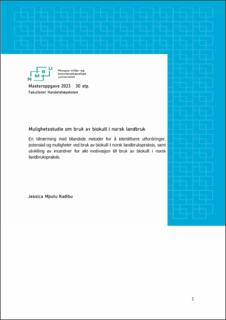| dc.contributor.advisor | Hovedveileder: Thore Larsgård | |
| dc.contributor.advisor | BYVEILEDER: | |
| dc.contributor.advisor | Valborg Kvakkestad | |
| dc.contributor.advisor | Daniel Rasse | |
| dc.contributor.author | Kadibu, Jessica Mputu | |
| dc.date.accessioned | 2023-11-13T17:27:17Z | |
| dc.date.available | 2023-11-13T17:27:17Z | |
| dc.date.issued | 2023 | |
| dc.identifier | no.nmbu:wiseflow:6873774:55153052 | |
| dc.identifier.uri | https://hdl.handle.net/11250/3102252 | |
| dc.description.abstract | Denne masteroppgaven har utforsket effektive strategier som kan stimulere økt bruk av biokull innenfor norsk landbruk. Hovedfokuset var derfor å evaluere insentiver som kan medvirke til å ekspandere biokullmarkedet som et jordforbedringsmiddel i landbrukssektoren. Biokull, et karbonrikt materiale produsert gjennom pyrolyse av biomasse, har demonstrert betydelig potensial for å forbedre jordhelsen, karbonbindingen og den helhetlige bærekraften i landbrukssektoren. Likevel møter markedet betydelige hindringer som begrenser produktets vekst i Norge.
Dette studiet initieres med en analyse av nåværende av biokull innenfor norsk landbruk gjennom en grundig gjennomgang av funn i tidligere studier. Formålet er å identifisere drivkrefter bak utviklingen av biokullmarkedet samt å belyse barrierer i den nåværende situasjon. Basert på resultatene fra denne studien kommer det frem klart at insentiver spiller en avgjørende rolle i å oppfordre bønder til å ta i bruk biokull. Økonomiske insentiver i form av subsidier, tilskudd, salg av CO2-kvoter og skattefradrag har vist seg å være effektive mekanismer for å minske de innledende investeringskostnadene for bøndene. Følgelig ble implementeringen av biokull som en bærekraftig jordforbedringsmetode mer attraktiv og økonomisk realiserbar for bøndene..
Denne tilnærmingen legger til rette for en økning i biokull-bruk og demonstrerer en positiv sammenheng mellom økonomisk støtte og utbredelsen av biokull-bruken. Betydningen av kunnskap og teknisk støtte blir også anerkjent som vesentlige insentiver. Ved å tilby seminarer, opplæringsprogrammer og ytterligere forskning, kan bøndene tilegne seg mer kunnskap om biokull og sikrere praksis. Denne verdifulle kunnskapen vil bidra til etableringen av et velfungerende marked og en sertifiseringsprosess for biokullprodukter, som vil kunne anvende ressurser på en effektiv måte og øke etterspørselen etter biokull.
Studien utforsker også muligheten for å inkludere biokull i karbonhandel og karbonkompensasjonsordninger. Ved å kvantifisere karbonbindingspotensialet til biokull, har bøndene potensial til å motta karbonkreditter, skape nye inntektsstrømmer og optimalisere ressursutnyttelsen. Deltakende forskning og åpen kommunikasjon med bøndene er nøkkelkomponenter for den vellykkede implementeringen av biokull-subsidier og fremme av bærekraftig praksis. Å tilpasse forskning og incitamenter etter bøndenes behov er avgjørende for å fremme biokull implementering innenfor norsk landbruk. | |
| dc.description.abstract | This master's thesis has explored effective strategies that can stimulate increased use of biochar within Norwegian agriculture. The primary focus was therefore to evaluate incentives that can contribute to expanding the biochar market as a soil improvement agent in the agricultural sector. Biochar, a carbon-rich material produced through the pyrolysis of biomass, has demonstrated significant potential to enhance soil health, carbon sequestration, and sustainability in the agricultural sector as a whole. However, the market faces significant obstacles that limit the product's growth in Norway.
This study commences with an analysis of the current utilization of biochar in Norwegian agriculture. The identification of driving forces behind biochar development, along with the illumination of barriers in the present situation based on previous studies, is the aim. Based on the results of this study, it becomes evident that incentives play a crucial role in encouraging farmers to adopt biochar. Economic resources in the form of subsidies, grants, sale of CO2 quotas, and tax deductions have proven to be effective mechanisms for reducing the initial investment costs for farmers. Consequently, the implementation of biochar as a sustainable soil enhancement method became more attractive and economically feasible for farmers.
This approach facilitates an increase in biochar usage and demonstrates a positive correlation between financial support and the proliferation of biochar use. The significance of knowledge and technical support is also acknowledged as pivotal incentives. By providing seminars, training programs, and further research, farmers can acquire more knowledge about biochar and safer practices. This valuable knowledge will contribute to the establishment of a functional market and a certification process for biochar products, effectively utilizing resources and increasing demand for biochar.
The study also explores the possibility of including biochar in carbon trading and carbon offset schemes. By quantifying the carbon sequestration potential of biochar, farmers have the potential to receive carbon credits, generate new revenue streams, and optimize resource utilization. Participatory research and open communication with farmers are key components for the successful implementation of biochar subsidies and the promotion of sustainable practices. Tailoring research and incentives to farmers' needs is essential for advancing the implementation of biochar within Norwegian agriculture. | |
| dc.language | nob | |
| dc.publisher | Norwegian University of Life Sciences | |
| dc.title | Mulighetsstudie om bruk av biokull i norsk landbruk - En tilnærming med blandede metoder for å identifisere utfordringer, potensial og muligheter ved bruk av biokull i norsk landbrukspraksis, samt utvikling av incentiver for økt motivasjon til bruk av biokull i norsk landbrukspraksis. | |
| dc.type | Master thesis | |
